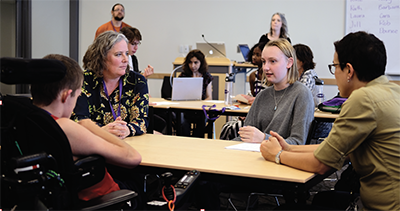Ableism in Everyday Language

“Ableism” is a broad term that covers a lot of territory: It includes thinking about attitudes, behaviors, and interactions that negatively impact people with disabilities. Sometimes it’s unintentional and meant to be benign, although it comes across as patronising. Other times it’s more intentional and meant to send a message that some individuals with disabilities aren’t actually disabled and are somehow “cheating” or “playing the system.” Usually, if we have heard about ableism, it’s in regard to behavior and interactions. For example, we may have had a bit of training on how to interact with people with disabilities; how to not grab a blind person’s arm to guide them, or how to not take control of someone’s wheelchair without being asked for assistance. We may have been told to not ignore or gloss over the fact that a co-worker has a disability; that our discomfort is our issue, not theirs. We may have been told that ignoring their reality and barriers can create an unsafe environment for a disabled co-worker to speak up and ask for what they need in order to do their job. If nothing else, we’ve probably all been told in diversity training that paying attention to how we behave and act regarding disability are important aspects of inclusion.
However, few of us think about how often we use ableist language, constantly and unthinkingly. It has been normalized in everyday English in a wide variety of examples:
- “My life has just been crazy lately!”
- “I was late to work again because of traffic. Seattleites drive like lunatics!”
- “He can be a real moron, can’t he? That was a dumb thing to say.”
- “Who came up with that idiotic idea anyway? It’ll never work, it’s just lame.”
- “Remember that student who became hysterical when she learned she failed your last exam? Totally spazzed out? Well, I have that nutjob in my class this quarter.”
- “They are really obsessed with their grade; they’ve gone all OCD on it and are emailing me a dozen times a day. It’s starting to drive me mad.”
- “Teaching during the COVID pandemic has just been next-level insane. I went to that seminar on how to teach online but the trainer was a total, disorganized nutter; it was like the blind leading the blind.”
While it may be surprising to realize just how often we use ableist language, with just a little conscious effort, we can move our vocabulary and word choices towards a more thoughtful, effective usage.
Learn more about ableist language:
- ACES-The Society for Editing: Ableism in Writing and Everyday Language
- The BBC: The Harmful Ableist Language You Unknowingly Use
- Harvard Business Review: Why You Need to Stop Using These Words and Phrases
Learn more about ableism in general:
- AccessLiving: Ableism 101
- The Bernard College Center for Research on Women: No Body Is Disposable
- Invisible Disabilities Association: Looks Can Be Deceiving
- National Public Radio: People With Invisible Disabilities Fight for Understanding